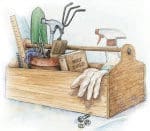The Fire Alarm and the Rule
I was exalted, then I was humbled and overwhelmed with confusion.
Psalm 88:16 and RB 7.53
Ever have one of those moments when you felt totally helpless? I did at a particular Easter Sunday service at St. Peter’s in Livingston, NJ where I was the rector.
As usual on a Holy Day such as Easter Sunday we had used incense. Everything was proceeding as normal—procession completed, altar censed, our opening acclamation “Christ is risen, the Lord is risen indeed, alleluia,” said with gusto and the Collect for Purity begun when suddenly, “BLAT….BLAT…BLAT.” The fire alarm in the church had been set off! After recovering from stunned shock, with another stunned shock, I realized that I hadn’t a clue as to what to do next! “Does anyone [BLAT] know what [BLAT] to do? [BLAT!!]” I pleaded through my microphone in competition with the alarm. I ran to the side doors near me, threw one open and discovered it didn’t have a hook or a latch to keep it from closing. Now what??! My chair from the Chancel became a temporary door stop. Someone else turned on the overhead fans and the windows were opened. Our thurifer had the presence of mind to speed into the sacristy and remove the smoking thurible, the cause of the excitement. I realized then that I had forgotten to tell him to place the thurible outside. Ooops! The alarm had been tripped by a hefty mass of incense as the doors and windows in the sacristy were closed.
The alarm continued its relentless and demanding “BLAT…BLAT…BLAT.” I felt helpless and overwhelmed with confusion! After a lifetime and with no help from me, the blatting stopped. Certainly more awake than we had been earlier, we backed up to the opening acclamation and began again.
In reflecting on this experience and my befuddledness, I recalled one of Benedict’s twelve steps of humility. It’s a tough one for most of us, right?.
The seventh step of humility is that we not only admit with our tongues but are also convinced in our hearts that we are inferior to all and of less value, humbling ourselves saying with the Prophet…I was exalted, then I was humbled and overwhelmed with confusion [Yikes. Yes, on both counts that Easter morn!] (Psalm 88:16). And again, It is a blessing that you have humbled me so that I can learn your commandments (Psalm 119:71,73).[i]
Statements like this can really raise the hackles of us 21st century independent people. In my book St. Benedict’s Toolbox I interpret the seventh step in this way:
“To truly believe in my heart that others are better than I am.” (p. 69)
Now that’s still hard to embrace. We like to believe that all we do is of consequence and indeed, I believe what we do is critical, especially as we interact with others. Yet we need to remind ourselves that the world and its well-being does not hinge on us alone. As was said to me once when I worked for Indiana Bell: “Jane, if you aren’t here the customers will still have dial tone.” Hmmmm…..
I think the truth is that if we believe what Benedict proposes in this seventh step of humility even just a little bit, we’ll be able to learn from others and that is so important. Otherwise we think that we have all the answers or at least the best answers to anything and miss some important learning. We need to adopt the mindset that the world is made better by us together. In any situation, someone will know what to do. On that infamous Easter Sunday morning amidst the blatting and unknown to me at the time, our highly efficient parish administrator had sped to the office to phone the alarm company and a young parishioner-fireman took immediate action by calling the fire department, “Hey, guys. Don’t send the hook and ladders! It’s just a bit of holy zeal.”
And so, lesson learned. In any situation, if you or I don’t have the skills or the presence of mind to meet the need of the moment, another person will. In this way a crisis is handled or a need is met. In this way, also, we can grow a bit humbler about who we are—we just might not have all the answers. We can also grow in our ability to respect others and the gifts and talents that God has given to them, and to find “joy in the gifts of others before having our own gifts noticed and rewarded.”[ii] As we do this we can keep ourselves in perspective and perhaps even grow to be better listeners/learners in even the calmer places of life.
Jane
April, 2012
© 2012 The Rev. Dr. Jane A. Tomaine
See A Tool For Appreciating Others here
[i] Joan Chittister O.S.B., The Rule of St. Benedict in English: A Spirituality for the 21st Century (New York: Crossroad Publishing, 2010), 91.
[ii] John Michael Talbot, Blessings of St. Benedict (Collegeville, MN: The Liturgical Press, 2011), 25.
